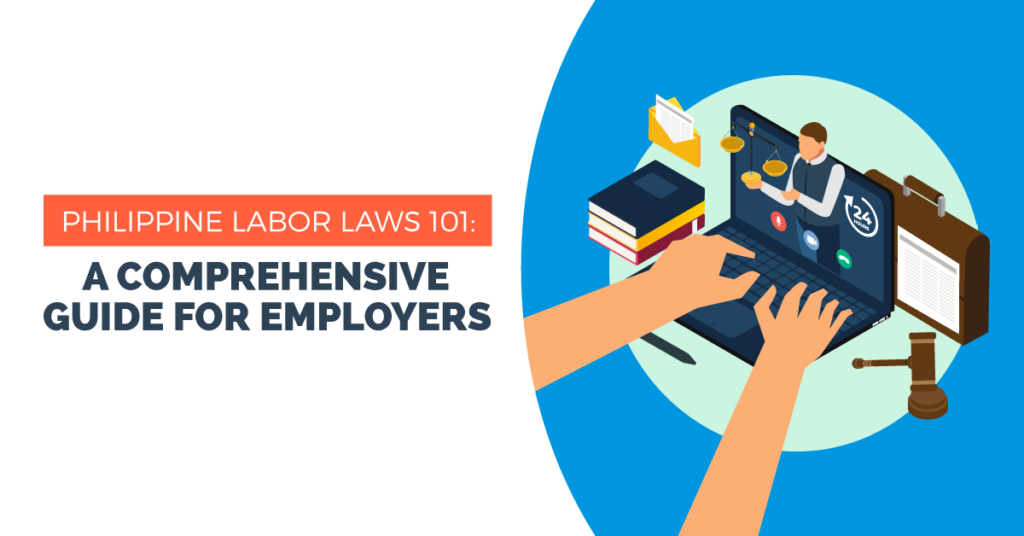
It’s been said that “ignorance of the law excuses no one.” This is especially significant for employers and their HR personnel who need to know the essential labor laws to ensure their employees’ well-being and the organization’s compliance with the law.
Labor laws were established to protect and safeguard the rights of employees in the workplace. Employers should observe these and abide by them lest they want to get in trouble with the law.
Let this infographic serve as your comprehensive guide to Philippine labor laws.

The Basic Rights of Filipino Employees
All Filipino workers have fundamental working rights. As an employer or a recrutment agency, it is your job to comply with these laws and give your workers their due rights to ensure their safety and livelihood. According to the Philippine constitution, the following are the basic rights of Filipino workers.
Equal Work Opportunities for All
The Department of Labor and Employment states employers must protect labor, provide equal work, promote employment regardless of race, gender, or creed, and regulate relationships with their employees. This law applies to situations such as paying someone less due to prejudice.
As a responsible employer, you should not be paying an employee less or denying them work due to the discriminatory factors stated.
Security of Tenure
The law states that employees have a right to job security. You cannot dismiss them due to unjust and unauthorized causes. Additionally, due process, which entails extensive investigation of a supposed incident, is necessary.
Just cause is defined as any form of wrongdoing an employee may commit, while an authorized cause is when the termination is based on reasonable grounds like redundancy and retrenchment. This fundamental right entails that you cannot terminate employees on a whim.
Work Days and Hours
All hours worked must be compensated appropriately. A typical workday is eight (8) hours with one (1) hour for meals and rest. Employees are also entitled to higher pay when working overtime or during the night shift.
Weekly Rest Day
Your duty as an employer involves giving your employees at least 24 hours of an uninterrupted rest day after every six (6) consecutive working days. However, the law does not explicitly state that a rest day should be on the weekend.
Wage and Wage-Related Benefits
Wage is compensation for services rendered by your employees. It can be fixed for a specific period. The minimum wage may vary depending on the sector or region where the worker is employed. Failure to appropriately compensate your employees is a direct violation of the law.
Female Employees
While already an outdated law, female employees are prohibited from reporting to night work, with some exemptions under specific rules and conditions. For Industrial work, they may report from 10 PM to 6 AM. Commercial, non-industrial, and agricultural work may be conducted between 12 AM and 6 AM, provided that they have had nine (9) consecutive hours of rest time.
Additionally, welfare facilities like independent dressing rooms and lavatories must be present in your work establishments.
Payment of Wages
The wage payment process involves all compensation paid in cash, legal tender, and on-site or near the workplace. Employers can opt to pay wages through bank transfers. All forms of wage payment must be paid directly to employees and given every two (2) weeks but not exceeding 16 days.
Employment of Children
The Philippines’ minimum working age is 15 years old. Any worker you employed before age 15 must have permission and be under the strict supervision of their parents or guardians. Additionally, you must ensure that the workload will not interfere with the child’s development or schooling.
DOLE issues work permits for hazardous jobs to legal adults or 18 years of age. In contrast, workers 15 years of age can only secure a work permit if the nature of the job is non-hazardous.
Safe Working Conditions
Regardless of industry or nature of work, the law states that you must provide safety precautions to protect your employees against sickness, injury, or death. On-the-job protection like proper ventilation, fire exits, fire extinguishers, and occupational health personnel or service must be present.
Rights to Self-Organization and Collective Bargaining
Collective bargaining refers to negotiating terms about a particular issue between the employers and employees. From the first day of employment, all workers already have the right to self-organize and join unions to take part in collective bargaining.
Employment Types in the Philippines
Employment type may vary on the company’s needs and standards. These are just some types that one can encounter in a Filipino workplace.
Regular Employment
Otherwise known as permanent employment, regular employment is when an employee conducts work deemed desirable or necessary by an employer. The primary standard deciding regular employment is the reasonable connection between job performance concerning the organization or its trade.
Casual Employment
Casual employment is when an employee’s work functions are not considered necessary or primarily related to your business or trade. Typically, casual employees are informed of a specific job timeframe before they start rendering any work.
It should be noted that casual employees who have rendered at least a year of service will automatically be regularized, whether the employment is continuous or not.
Probationary Employment
Employees under probation go through a trial period to decide if their skills and quality of work are up to par before being regularized. They are granted security of tenure throughout the trial period and cannot be dismissed without authorized or just cause.
Project Employment
Project employment entails hiring employees for a specific project in a set period, depending on the size and scope of the workload. Project employees may be retained and regularized if their work is categorized as necessary, vital, and indispensable to the usual business functions.
Seasonal Employment
Seasonal employees are hired only for a specific time or season. It is a common practice in the retail, food, and industry sectors due to the volume of guests and customers during peak seasons.
Additionally, you can negotiate a regular seasonal employee arrangement with workers. During the off-season, employees are temporarily laid off, then reemployed during peak seasons or holidays.
Fixed-term Employment
Fixed-term or contractual employment is when you hire employees for a job with a set elapsed time. You and a fixed-term employee negotiate contract terms beforehand, and their tenure will automatically be terminated once the contract ends.
Government-mandated Contributions and Benefits
Every employee is entitled to various government-mandated benefits. Their contributions fund their needs, such as healthcare, loans, and many more.
Contributions:
-
Social Security System (SSS)
SSS is a social insurance program. Monthly salary deductions of 12% give members access to sickness, disability, retirement, death, and funeral benefits. Aside from these, SSS members also qualify for salary, business, housing, and educational loans.
-
Home Development Mutual Fund (Pag-IBIG)
Pag-IBIG is the Philippines’ national savings and affordable housing finance program. Pag-IBIG also offers multi-purpose loans and savings programs for its qualified members.
The fixed monthly contribution is ₱200. Employers will shoulder ₱100, and the remainder is deducted from the employee’s salary.
-
Philippine Health Insurance Corporation (PhilHealth)
PhilHealth implements the National Health Insurance Program to provide Filipinos with financial aid and access to affordable healthcare services. The program covers hospital costs, room and boarding, medicine, and professional services.
Contributions may vary depending on an employee’s salary. The minimum contribution is ₱400, while the maximum is ₱3,200.
Benefits:
-
13th-Month Pay
The 13th-month pay is a monetary bonus mandated by law that any private employee with a fixed or guaranteed salary rendered work for at least one (1) month will receive. The payout is given either in two installments or in total on or before December 24th.
-
Overtime Pay
Employees who render work beyond eight (8) hours are entitled to overtime pay. Additional compensation equates to their regular hourly wage, at least 25% of the premium.
-
Premium Pay
Employees who work on official holidays or rest days are entitled to premium overtime pay. Regular workday rates will be in effect, plus at least 30% of the wage.
-
Night Shift Differential
Night differential applies to employees who render work between 10 PM and 6 AM. Additional compensation of 10% based on their regular hourly rate is applied for every hour rendered.
-
Separation Pay
Otherwise known as severance pay, it is compensation given to workers terminated from a company. Those removed because of criminal involvement or misconduct are not entitled to this benefit.
-
Retirement Pay
Employees who’ve reached 60 years of age or more with at least five (5) years of service with a company may be granted retirement pay. The retirement pay will be equivalent to at least one-half month of salary for every year of service. A fraction of at least six (6) months is considered one whole year.
Predominantly goods that are not monetary. De minimis benefits are optional leave credits or small money loans. Different categories within de minimis benefits are calamity leave, rice subsidy, clothing, laundry, meal, or transportation allowance.
Leave Benefits:
-
Sick Leave
Sick leaves are taken by employees who are not fit to work due to illnesses or disabilities. Employees may also take this leave to care for a sick family member.
-
Vacation Leave
While not mandated by law, several companies grant vacation leaves to employees to attend to personal matters. These can be used for rest or leisure.
-
Parental Leave
Parental leave is a statutory benefit that allows new parents to care for and spend time with their newborns. If the employee has rendered at least one (1) year of work in the company, they’re entitled to this benefit and are assured job security.
- Bereavement Leave
Bereavement leave is a paid leave available to employees following the death of an immediate family member. The temporary leave will grant the employee ten (10) days to attend to funeral arrangements and other concerns related to a loved one’s death.
-
Special Leaves
Female employees who underwent surgery due to gynecological disorders are granted two (2) months of special leave with full pay. Pay will be based on the employee’s gross monthly compensation, subject to existing Philippine laws, rules, and regulations
Fight for the Right
As a responsible employer, knowing your employees’ rights is in your best interest. While some may feel that regular compensation is enough to keep workers happy, employee-related laws are created for a purpose. They ensure that the workplace is a fair and nurturing environment for all types of employees to excel and feel valued.
If you need help with HR and staff management, consider reaching out to Manila Recruitment. The premier recruitment agency in the Philippines, Manila Recruitment aims to deliver elite headhunting agency service in Manila for worldwide and local Filipino clients. For inquiries, contact us today.
DISCLAIMER: The information in this webpage / blog / article / infographic we have published and the associated commentary are presented as general information and is not a substitute for obtaining legal advice in this area. Manila Recruitment does not accept liability for any action taken based on the information presented or for any loss suffered as a result of reliance on the information provided.













